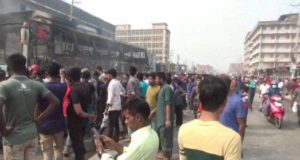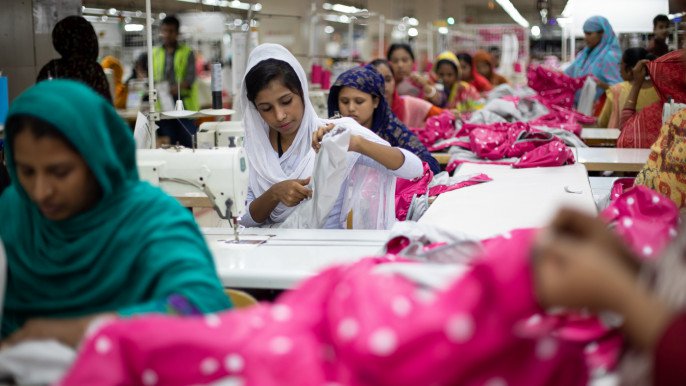Published in Dhaka Tribune on April 24, 2018

Photo: Rajib Dhar/ Dhaka Tribune
Labour leaders say unions need to be independent of foreign funding and NGOs and must unite to fight for their rights
Rabeya Khanom, an operator at an Ashulia-based garments factory, says she feels safer at her workplace now than in the past due to significant improvements made to fire, electrical and structural safety regulations in the five years since the Rana Plaza tragedy.
In spite of this, however, Rabeya and thousands of other workers in the $28 billion Bangladesh apparel industry remain afraid of participating in trade unions, or of speaking out in defence of their rights.
“I have witnessed my colleagues being harassed or threatened with termination for their involvement in unionism,” she said.
Babul Akhter, the president of the Bangladesh Garment and Industrial Workers Federation, believes the improvements made to workplace safety since the Rana Plaza disaster have far outpaced any advancements in guaranteeing worker rights.
“A huge amount of money has been spent to improve safety standards and ensure workplace safety, but the progress in implementation of initiatives for ensuring worker rights and legal protection is very poor,” he said.
Today marks five years since workers were forced to enter the risky eight-story Rana Plaza building in Savar, minutes before it collapsed on top of them, killing at least 1,138 and injuring over 2,000 workers.
The incident brought global focus to the industry’s lack of safety standards. As a consequence, buyers and owners were forced to take several initiatives that have proved to be transformative.
With less success, worker rights groups and trade unions urged the government and stakeholders to empower workers to raise their voices against any future breaches of their rights.
Are trade unions functional?
In the aftermath of the April 24, 2013 factory disaster, the number of trade unions in Bangladesh proliferated.
Rights activists and trade union leaders, however, question their effectiveness, as well as that of the safety committees.
“Workplace safety is for the sake of factory owners as well as the buyers and brands,” Rabeya said. “Safety will (only) be sustainable when workers are empowered to speak out against safety hazards.”
According to the Joint Directorate of Labour (JDL), a total of 478 trade unions have been registered in the RMG industry since 2013, of which 382 are in factories in the Dhaka division and 92 in Chittagong.
“The number of trade unions and safety committees in the RMG sector is satisfactory, but the question is whether they are functional or able to work freely,” the Bangladesh Institute of Labor Studies (BILS) executive director, Syed Sultan Uddin Ahmed, said.
“The fear of losing jobs still haunts workers and a union loses its effectiveness when it members lose jobs for their involvement.”
Sultan said the issue of occupational health is still not properly addressed in regulations.
“There is also a lack of professionals in the government bodies who can identify the health hazards. Another concern is excessive working hours and the increase in work targets, which should be addressed properly to prevent long-term health impacts on workers.”
Factory owners, on the other hand, say unions are playing a disruptive rather than a constructive role.
“Fair trade unionism is not happening in the Bangladeshi RMG sector,” BGMEA Vice President Mohammed Nasir said. “This is may be because of the lack of knowledge of workers or union leaders, or something else.”
Nasir claimed the union leaders are unable to guide the workers in a proper way, or to teach workers about their rights.
“Sometimes the trade union leaders or workers come up with irrelevant demands; these things hurt the industry,” he said.
“The factories do not bar workers from forming trade unions. The process of registration is now online and even the owners cannot know anything about it.”
Why unions fail to move demands forward
The unions and their federations are not without their own internal issues.
“There are many divisions among trade unions and federations, many of which are along political lines,” the former Jatiya Sramik League general secretary, Roy Ramesh Chandra, said.
“In comparison, there is a great unity among the owners and groups such as Bangladesh Employers Federation, BGMEA, BKMEA in achieving their rights as business groups from the government.”
Roy – who is also secretary general of IndustriAll Bangladesh Council – criticized the roles played in trade union by foreign funds and non-government organizations (NGOs).
“(They) are harming the trade unions and tarnishing their glory and tradition,” said Roy. “Capitalism has entered into the unions, and the institutions would not be effective and get back their dignity until they are run with their own funds.”
Ways forward
Roy said the absence of a collective voice of workers to raise safety concerns led to the Rana Plaza disaster – the worst industrial incident to hit Bangladesh.
“The workers were forced to enter the factory despite it having a crack in the wall,” he said. “The government as well as the industry people need to ensure the worker rights to raise their voices.”
He also recommended a one union per factory, and one federation per industry, policy to ensure functional trade unions. “The process should be democratic and there will be representation of workers,” he said.
Babul Akhter said the Department of Labour should be empowered to stop the harassment of workers by owners. “Further amendments should (also) be brought to the Labour Act to ease the trade union registration and operation,” he said.
Sirajul Islam Rony, president of Bangladesh National Garment Workers Employees League, said a continued lack of worker awareness about trade unionism is not good for the industry.
“An effective and participatory trade union can create better working environment and help the industry grow,” he said. “I urge the government to take steps to make the registration process quicker.”
For her part, Rabeya believes the RMG sector will only become sustainable if workers have the right to be associated through collective bargaining, in order to realize benefits such as maternity leave, retirement benefits, and yearly increments.
 CPD RMG Study Stitching a better future for Bangladesh
CPD RMG Study Stitching a better future for Bangladesh




